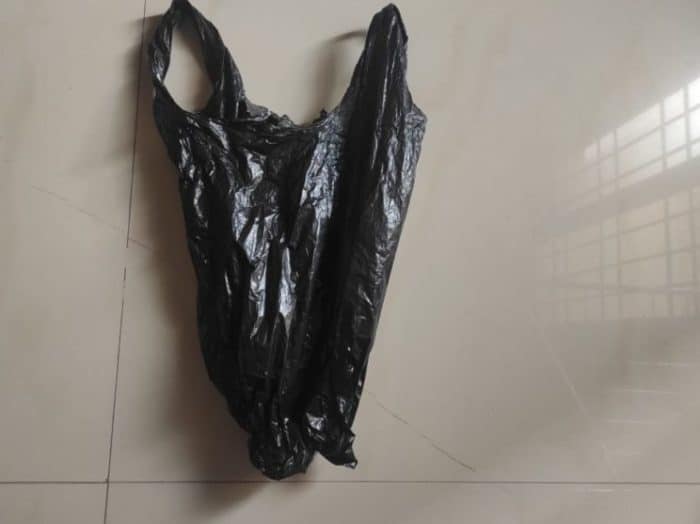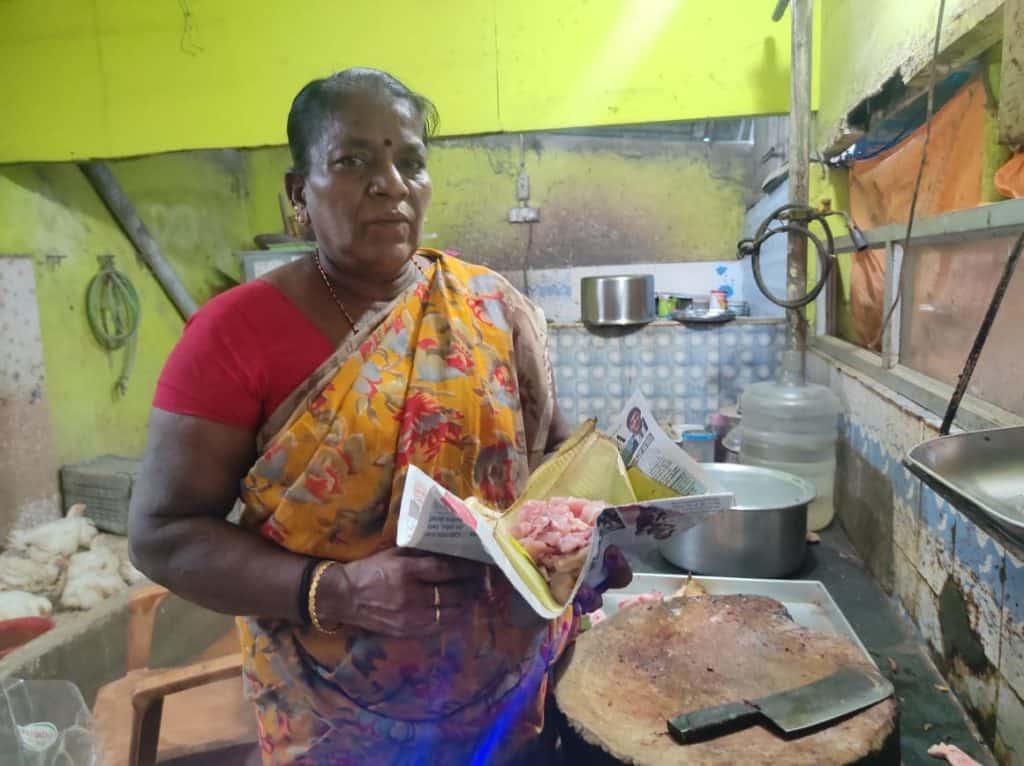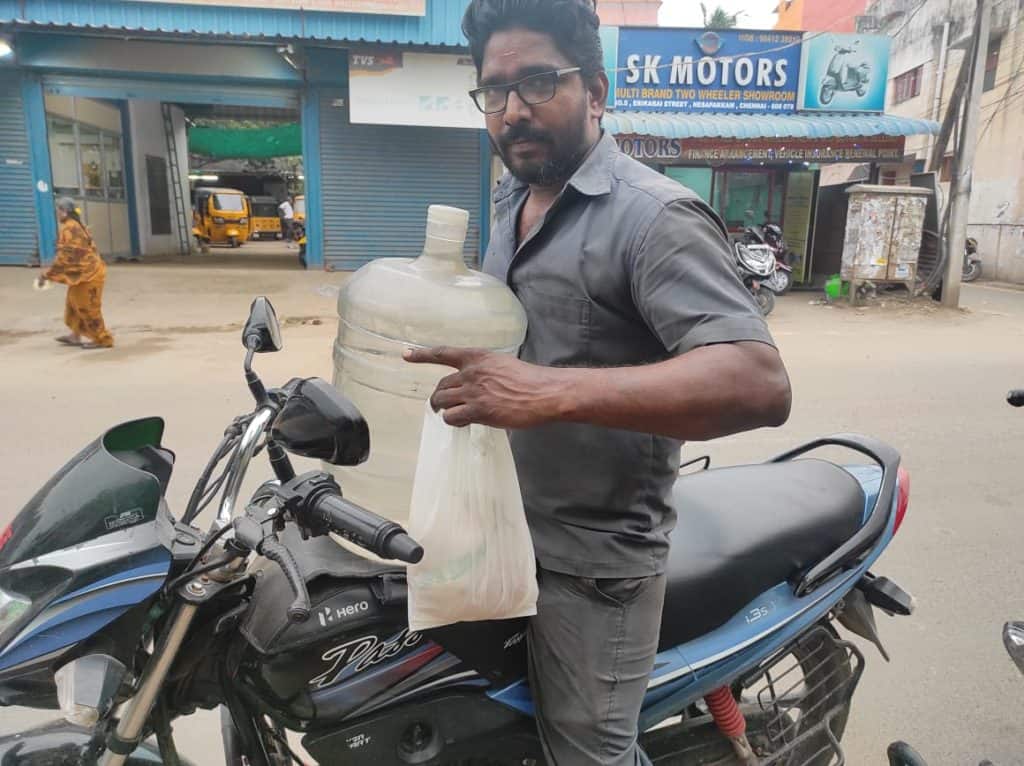“Most of the meat and fish vendors in Chennai use single-use plastic bags. But today, we have to hide it and use it,” said Raman* the owner of a meat shop in Nesapakkam. The plastic ban has caused a major predicament among small vendors of meat and fish across Chennai.
The Tamil Nadu government banned a list of single-use plastic items, including plastic bags of all sizes and thicknesses. The Greater Chennai Corporation has also announced that the shops violating the ban will be sealed and their licences cancelled.
Almost 98% of people consume meat in Tamil Nadu, according to the recent National Family Health Survey-5. Despite the strict rule, meat shops continue using banned plastic bags. The reasons for this are manifold and point to a lack of necessary conditions created to embrace alternatives to plastic prior to the implementation of the ban.
Why do meat vendors still use single-use plastic in Chennai?
The cost of the alternatives to single-use plastic packaging is one major factor in Chennai meat vendors’ continued use of the banned material.
“Bioplastics is touted as an alternative for single-use plastic. But it costs Rs 330-380 per kilogram, while single-use plastic cost around Rs 100 per kilogram,” said Raman. “I used to buy single-use plastic bags for Rs 5000 per month. Now, I have to shell out three times more than that amount. I have contemplated increasing the meat prices to manage the overhead costs.”
But when he heard that other vendors are still covertly using black polythene covers, he also followed suit, afraid that he will lose business if the prices he offered were not competitive.
The strength of bioplastics is also questionable. The meat vendors in Nesapakkam and Valasaravakkam say that one bioplastic cover is not enough to hold the meat. “Bioplastic bags tear, unable to bear the weight of the meat. Most customers ask for two bags instead of bringing their own containers or bags,” said a meat shop owner in Saligramam, adding that the expensive price of bioplastics is burning a hole in his pockets too.
When asked where the meat vendors are getting single-use plastic, the vendors replied that they source them clandestinely from Parrys and Koyambedu.
“We are aware of the ban, and the harm of plastic to the environment. When we put our foot down to customers to ask them to bring their own containers/bags, they go to some other shop which uses plastic bags. We will lose business at the end of the day,” said Raman. “We request customers to change their attitude.”

“Usually, I am asked to buy meat when I am returning home from work. I do not have any containers at the time and I need a bag to carry the meat,” said a customer outside the meat shop in Ramapuram.
Some meat vendors like PS Manavalan of Priya Proteins from Pudupet have attempted to encourage customers to bring their own bags by offering a 5% discount to those who bring their own reusable containers for carrying the meat.
He also has a small stock of bioplastic bags but recommends people bring their own containers or bags. “If our meat quality is good, why would we lose our customers? Even they know about the single-use plastic ban in Chennai. I did not lose business when I made the change last year,” said Manavalan.
Even as physical stores attempt to find alternatives, online vendors of meat, a business growing in volume, also use single-use plastic and offer deep discounts that make it attractive to customers.
Read more: Must return to our past and ‘Manjapai’ for a better, plastic-free future: Supriya Sahu, IAS
Why bioplastic bags are not the perfect alternative to banned plastic bags?
Although the Manjappai campaign by the Tamil Nadu government aimed at people using cloth bags instead of plastic bags, meat and fish cannot be packed in cloth or paper bags, due to their moist nature. Even if some meat vendors wrap it in banana leaf and paper, they use carry bags and hand it to customers.
The next available alternative to meat vendors and customers is the use of bioplastic bags. Bioplastics are made from vegetable oil, while the banned plastic is made from petroleum products. But this too comes with its own problems.

“Bioplastics are expensive because the demand has not yet increased,” said Kaushik Dowerah, an environmental researcher from Pondicherry University. Bioplastics are 50 times more expensive to produce than petroleum plastic bags — the banned ones.
“Bioplastics also consist of functional groups that can interact with the atmosphere, making it less strong than petroleum plastics,” said G. Gnanamani Simiyon, a professor of Chemistry at Madras Christian College. With less structural integrity, the chances of these bags breaking are higher.
Even their claim of it being less harmful to the environment does not completely hold water, defeating the purpose of the exercise of banning plastic. “Bioplastics need industrial conditions to degrade, if not they will fragment to form microplastics,” said Krishnapriya, Business Development Manager of Spreco Recycling, a waste management company. “We do not have an extensive enough infrastructure to degrade bioplastics.”
Read more: Chennai is breathing in plastic, the south more than the north
Solving the single-use plastic conundrum of meat vendors
“The ban needs to go hand-in-hand with campaigning and phased removal of single-use plastic in Chennai,” remarked Krishnapriya.
A wholesale ban without the creation of alternative solutions for vendors will only increase the sale of plastic as contraband.
Around 2550 shops have been fined a total of Rs. 9.17 lakhs by the Greater Chennai Corporation for using and hoarding single-use plastic. “Meat shops are usually fined Rs. 2000-5000 each time for such violations,” said Manavalan.
“(But) cracking down only on the last members of the supply chain like meat vendors is ad-hoc. The authorities need to focus on plastic distributors and producers,” said Geo Damin, an environmental engineer with Poovulagin Nanbargal.
“It is relatively more sustainable when industries produce reusable metal or plastic containers than producing single-use anything, even in the case of bioplastic bags or areca nut plates. Reusable packaging is a truly sustainable measure to end the single-use menace in Chennai,” he added.
Consumer responsibility is also an area that has not received much focus when it comes to eradicating single-use plastic in the context of meat shops.
“People must be held accountable for using single-use plastic. People who come from plastic-free towns like Kanyakumari also tend to use plastic in Chennai when they buy meat. Innovative campaigns must be held to bring behavioural change. Celebrities can be roped in to promote the culture of reuse and embracing sustainable packaging,” said Geo.
“Meat vendors also have to put their foot down and act collectively to bring about a change. Right now we are all stuck in a rat race and apprehensive of losing customers. If a person does not bring a reusable container or bag, then we must wrap the meat in banana leaf or newspaper and sell it,” said Manavalan.
*Name changed on request
